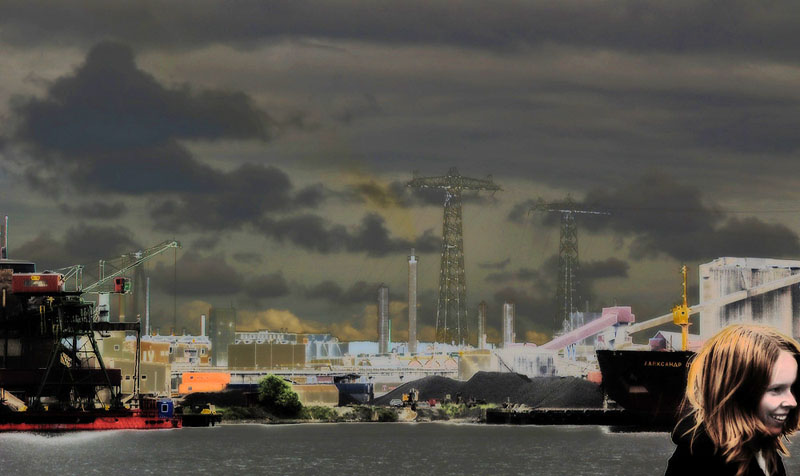Part III: Bjorn on the Environment

The Future is Tomorrow (c) Bjorn Rorslett
JM: This may seem like a silly question considering your life-long profession, but do you consider yourself as an environmental activist?
BR: Yes, in a more indirect background sense of the word. This means I'm no longer on the barricades, as I did in my younger days, but I contribute to people getting better insight and information on ecological and conservation issues. Together with colleagues I have made exhibitions from endangered areas to put pressure on environmental authorities, and in one particular case, our work was instrumental in giving a threatened woodland area status as a Nature Reserve.
JM: ...This means I no longer am on the barricades, as I did in my younger days... What kind of issues were you fighting for?
BR: In those days, the main issues were pollution abatement, endangered species and biotope protection, and getting politics into the environmental questions. Only by international cooperation and pressure could one hope to get any reduction of, for example, acid rain which at that time dramatically impacted large areas of Norway.
JM: What sorts of actions/groups are you involved with?
BR: I do most of the work as a member of my professional organization,
http://www.norskenaturfotografer.com/ (Norwegian Nature photographers)
.jpg)
End to a Means is the Means to an End (visible) (c) Bjorn Rorslett
JM: What issues do you see as the environmental stressors that are seriously impacting your homeland and the greater environment?
BR: Lack of knowledge of, and insights into, environmental and ecological issues is steadily increasing. This trend is currently permeating the entire national community on all levels of political influence. In all my work, I try to show that Nature has a value of its own, an Eigenvalue in the words of Kant, which just exists totally independent of mankind, and we as a species should be obliged to respect.
JM: What do you consider to be the largest dangers to your homeland as well as the greater ecosystem?
BR: As I said before, ignorance and lack of insight into the environment as such and the belief that man can do anything which pleases him.
I live in a country where the sky is clear and you can drink water directly from a brook in the forest or in the mountains. However, you have to keep an eye out out for tell-tale signs of pollution everywhere. So our countryside has lost much of its pristine character already. Roads criss-cross the country to such extent that only a few percent of the geographical area are located more than 5 km away from a road. This means thattrue wilderness is very hard to find, and this in a country where the median itude is
900 m.a.s.l. (50% of Norway is above this itude).
If a new oil source is found inside a region important to fisheries, politicians are eager to tell all about zero emission technology. They might even believe such a contradiction exists, at least until the first spill occurs to destroy a fishery resource. Then, they go around in circles trying to find the culprit and promise such incidents will never happen again. They may even stop oil production for a week or two, at the most. It all boils down to the belief that man stands above everything else, which really sickens me.
JM: Is this scenario that you just described a real scenario, or is it hypothetical?
BR: Absolutely not. Oil exploration is now taking place in the Barents Sea and off the Lofoten Islands. Both of these places are major spawning areas for cod and other fish species. There have been a number of oil spills already to the embarrassment of the Authorites claiming zero-risk technology had been applied.
.jpg)
In The End, There is Just Another Beginning (visible) (c) Bjorn Rorslett
JM: What real things do you think that people can do to be helpful?
BR: Accepting Man's position in Nature.
JM: What do you think it will take for Man to really understand his place in Nature?
BR: It will never happen. We are too egoistic for that.
JM: Do you have any specific environmental organizations that you would like to talk about that are doing work that you feel is of a greater service? What sort of things are they doing?
BR: In Norway, as in any other country, there are groups of people trying to reverse the exploitation of Nature for the benefit of mankind at whatever cost to the environment. The sad thing is that they must go on a political war path to achieve anything, because our society is run by politicians which only understand political and economical ramifications of their own actions. So the environmental parties must speak a similar language. Just restating the need for environmental concern and nature protection simply doesn't come over to the targeted audience. I see organizations such as Greenpeace and Attac in this context. Other organizations do focus more directly on human rights, but indirectly, they improve the attitude toward the non-profit aspects of humanity and our communities, Amnesty International springs to mind here.
Thanks again to Bjorn Rorslett for having taken the time to do this interview for NWP. If you would like to see more of Bjorn's work, or learn more about him, please feel free to check out his website at
http://www.naturfotograf.com/As always, we encourage you to come join the community and to be participants in the forum. Just another reminder that this article is copyright 2005-2011, James Morrissey, and may not be reproduced, in part or whole, without explicit permission from James Morrissey. The images in this article are the property of Bjorn Rorslett and have been licensed to NWP for the purpose of this article.